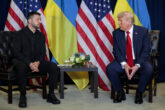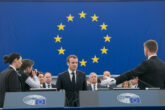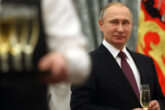January 22, 2019
Europe and the United States: A Diverging Approach Toward Russia?
By Rachel Rizzo:
Over the course of the past two years, the U.S.-European relationship has gone from bad to worse. President Trump has repeatedly derided NATO allies, called the European Union a “foe,” and said Germany is a “captive” of Russia due to its reliance on Russian natural gas. Trump walked away from the Iran nuclear deal, re-imposing sanctions that threaten to disrupt Europe’s commercial relations with Tehran, which makes joint action on Iran’s malign regional activity (an area of transatlantic agreement) difficult to sustain. It is incumbent on the newly-minted U.S. Congress to take these views under consideration when contemplating new Russia sanctions. A diverging approach toward the future of Russian sanctions, in particular, may tip the scale of the U.S.-European relationship from worse to ugly.
Based on public and private statements from European policymakers, there is something qualitatively different about the tensions in this stage of the relationship. A harsh White House narrative is driving Europeans to do more in terms of their own defense, security, and economic autonomy. Europe is now actively trying to take more responsibility for its future and demonstrate its chops on the world stage—potentially at the expense of the United States.
Congress should use its oversight responsibilities to ensure that if the United States broadens its sanctions against Russia over the coming year, it minimizes disruptive effects on European economies.
It is no secret that Donald Trump has a strained relationship with EU leaders. Earlier this year, European Council President Donald Tusk tweeted a wry thank you to Donald Trump, saying, the “EU should be grateful. Thanks to him we got rid of all illusions. We realise that if you need a helping hand, you will find one at the end of your arm.” It is clear the EU is beginning to lose patience with the United States.
This is remarkable, because the United States’ and European Union’s response to Russia’s nefarious activities abroad has generally been an area where the two sides have agreed. Both slapped sanctions on the Kremlin after its 2014 illegal annexation of Crimea. In December 2018, the EU decided to continue those sanctions (which include travel bans and asset freezes) against 155 Russian individuals and 38 Russian companies. But given the fractured politics of the EU, it has been hard to get it to expand the sanctions regime beyond just Ukraine and Crimea to include sanctions for things like election meddling and the poisoning of Sergey Skripal and his daughter in Salisbury last May. This is disappointing to both sides of the aisle in Congress, who feel that Russia has gotten off easy.
Congress should use its oversight responsibilities to ensure that if the United States broadens its sanctions against Russia over the coming year, it minimizes disruptive effects on European economies. Germany is a bellwether in this respect, with its close economic relationship with Russia an important domestic political consideration. While pushing back against Russia is a vital national interest, the United States would not be well served by an EU that actively resists U.S. economic and security leadership in an effort to protect its own economic interests.
Rachel Rizzo is the 1Lt Andrew J. Bacevich, Jr., USA Fellow at the Center for a New American Security (CNAS), working in the Transatlantic Security Program. Her research focuses on European security, NATO, and the transatlantic relationship.
Read the full CNAS "U.S. Strategies to Counter Russia" commentary series below:
Embedding Sanctions in U.S. Russia Strategy
- Edward Fishman, "Russia Sanctions in 2019: Clarifying a Strategy"
- Peter Harrell, "The Goals of Sanctioning Russia"
Prospects for Transatlantic Cooperation on Russia Policy
- John Hughes, "The U.S. & Europe May Return to Common Sanctions Policies on Russia"
- Elizabeth Rosenberg, "U.S. Policy Toward Russia and a Deepening Transatlantic Divide"
- Rachel Rizzo, "Europe and the United States: A Diverging Approach Toward Russia?"
Russian Domestic Politics and Greater Russia-China Cooperation
- Neil Bhatiya, "What Pressuring Russian Oligarchs Accomplishes"
- Ashley Feng, "China-Russia Cooperation Presents a Fresh Threat to the United States"
- Andrea Kendall-Taylor, "U.S. Russia Policy: Moving Beyond Sanctions"
Russia’s Macroeconomic Vulnerabilities
- Sam Dorshimer, "Considering Sanctions on Russian Sovereign Debt"
- Rachel Ziemba, "Russia’s Resiliency Toolkit"
More from CNAS
-
What’s Driving President Trump’s New Confidence in Ukraine’s War Effort
President Trump dramatically declared on social media that he now believes that Ukraine can reclaim all its land from Russia, which he described as a paper tiger. From the Ova...
By Richard Fontaine
-
‘The U.S. Has Got to Get Involved’: Townsend on NATO Boosting Polish Air Defences
Jim Townsend, adjunct senior fellow at the Center for a New American Security, discusses what actions NATO countries need to take amidst Russia’s incursions of NATO airspace.W...
By Jim Townsend
-
Defense / Transatlantic Security
Europe’s Delusions Over What It Means to Deter RussiaToday’s European leaders are in a Singapore trap, crafting a training mission designed to signal resolve rather than achieve an actual military objective....
By Franz-Stefan Gady
-
The Wrong Way to Do Diplomacy With Russia
In fact, the summit helped Putin legitimize Moscow’s grievances, giving Russians who might doubt the wisdom of the invasion reason believe that it was, as Putin promised, just...
By Celeste Wallander




